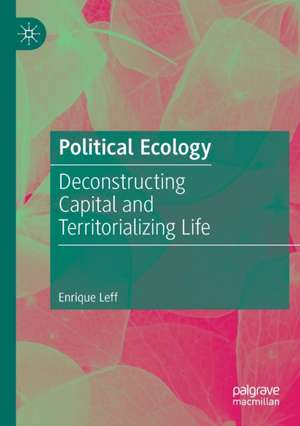Political Ecology: Deconstructing Capital and Territorializing Life
Autor Enrique Leffen Limba Engleză Paperback – 24 feb 2022
| Toate formatele și edițiile | Preț | Express |
|---|---|---|
| Paperback (1) | 733.33 lei 6-8 săpt. | |
| Springer International Publishing – 24 feb 2022 | 733.33 lei 6-8 săpt. | |
| Hardback (1) | 738.69 lei 6-8 săpt. | |
| Springer International Publishing – 24 feb 2021 | 738.69 lei 6-8 săpt. |
Preț: 733.33 lei
Preț vechi: 894.31 lei
-18% Nou
Puncte Express: 1100
Preț estimativ în valută:
140.32€ • 146.90$ • 116.11£
140.32€ • 146.90$ • 116.11£
Carte tipărită la comandă
Livrare economică 05-19 aprilie
Preluare comenzi: 021 569.72.76
Specificații
ISBN-13: 9783030633271
ISBN-10: 3030633276
Ilustrații: XX, 446 p.
Dimensiuni: 148 x 210 mm
Greutate: 0.61 kg
Ediția:1st ed. 2021
Editura: Springer International Publishing
Colecția Palgrave Macmillan
Locul publicării:Cham, Switzerland
ISBN-10: 3030633276
Ilustrații: XX, 446 p.
Dimensiuni: 148 x 210 mm
Greutate: 0.61 kg
Ediția:1st ed. 2021
Editura: Springer International Publishing
Colecția Palgrave Macmillan
Locul publicării:Cham, Switzerland
Cuprins
1. Unbinding the Sustainability of Life on Earth.- 2. The Social Re-appropriation of Nature.- 3. Space, Place and Time: The Local Construction of an Environmental Rationality.- 4. Environmental Rationality and the End of Natural Dialectic.- 5. Marx’s Theory of Value, Technological Change and the Forces of Nature.- 6. Revaluing Nature: : From Exploitation of Peasantry in Capitalism to Emancipation of Indigenous Peoples and Sustainability of Life on Earth.- Chapter 7. Marxism and the Environmental Question: Towards an Environmental Rationality for Sustainability.- Chapter 8. De-growth or Deconstruction of the Economy: Towards a Sustainable World.- 9. Bioeconomics, Negentropic Productivity and Eco-social Sustainability.- 10. Political Ecology: A Latin American Perspective.- 11. Power-Knowledge Relations in the Field of Political Ecology.- 12. The Social Enownment of Nature, the Reinvention of Territories and the Construction of an Environmental Rationality; Carlos Walter Porto Gonçalves and Enrique Leff.
Notă biografică
Enrique Leff is Senior Researcher for the Social Research Institute and a professor in the Faculty of Political and Social Sciences at the National Autonomous University of Mexico. He is an environmental theorist working in the fields of Political Ecology, Environmental Epistemology and Philosophy, Ecological Economics and Environmental Education. He was UNEP’s Coordinator of the Environmental Training Network for Latin America and the Caribbean (1986-2008) and UNEP’s Coordinator for Mexico (2007-2008).
Textul de pe ultima copertă
This book offers a conceptual framework for the critical understanding of the present socio-environmental conflicts. It reflects on the evolution of subject and thought, a shift in environmental thinking triggered by the development of eco-territorial conflicts and the social responses given to the environmental question. Bringing together 40 years of the authors writing and research, the book explores the transition from ecological economics and historical materialism to ecological Marxism. It unpacks the forging of political ecology from value theory in political economy, to ecological distribution and ecologies of difference; a transition to an environmental rationality grounded in the ontology of diversity, a politics of difference and an ethics of otherness. This evolution in thinking gives consistency to a theoretical discourse able to respond to the territorial conflicts generated by the radicalization of the environmental question as a key social issue of our times. The book isa call to respond to the urgent challenge of reversing the tendency towards the entropic death of the planet and to building a sustainable world order.
Enrique Leff is Senior Researcher for the Social Research Institute and a professor in the Faculty of Political and Social Sciences at the National Autonomous University of Mexico. He is an environmental theorist working in the fields of Political Ecology, Environmental Epistemology and Philosophy, Ecological Economics and Environmental Education. He was UNEP’s Coordinator of the Environmental Training Network for Latin America and the Caribbean (1986-2008) and UNEP’s Coordinator for Mexico (2007-2008).
Caracteristici
Critiques the dominant geopolitics of “sustainable development” Explores how the development of eco-territorial conflicts has affected environmental thinking Introduces new concepts for the development of a sustainable world order
